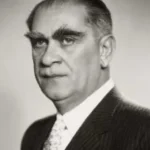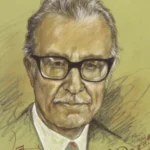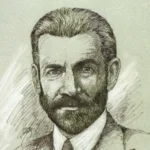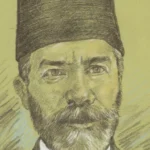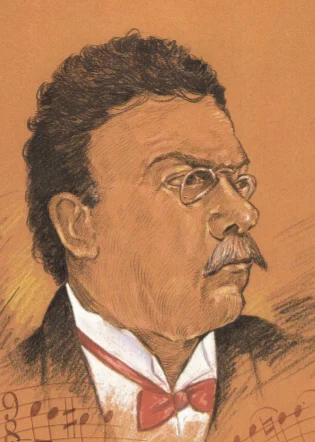
Ahmed Rasim Bey was born in 1864 in Sarıgüzel, Istanbul. His father was Bahaddin Efendi from Cyprus (Menteşeoğlu), and his mother was Nevher Hanım. Ahmed Rasim attended a local primary school and entered Darüşşafaka in 1875. He studied there for eight years and graduated with top honors in 1883. He then worked in the technical office of the Ministry of Post and Telegraph. After working there for a year and a half, he resigned. Shortly after, he served as a member of the inspection board of the Ministry of National Education for a brief period.
Encouraged by Ahmet Mithat Efendi, Ahmed Rasim began his career in journalism. From 1891 onward, he became known as one of the prominent writers of Bâbıâli (the Ottoman center of press and government). During the Republican era, he was elected as a member of parliament for Istanbul in 1927. When he arrived in Ankara, he had no financial means and had to stay in a room at an inn. A relative who noticed this situation brought it to Atatürk's attention during a dinner at Çankaya. Upon hearing the news, Gazi (Atatürk) was deeply saddened. He sent his aide to invite Ahmed Rasim Bey to Çankaya. Feeling embarrassed because he had no proper clothes to wear, Ahmed Rasim hesitated, but Atatürk personally welcomed him and invited him to sit beside him. After a long conversation, Atatürk said: “Master! You come to Ankara and don’t let us know. We’ve missed you. I’d like to make a proposal and kindly ask that you accept it. If we nominate you for one of the vacant parliamentary seats, would you agree?” Faced with such hardship, Ahmed Rasim expressed his gratitude for this kind and heartfelt offer: “Your Excellency! There is a saying: ‘A morsel lies in the lion’s mouth.’ It turns out that this saying is indeed true. And now, I have finally reached that morsel.
He died at the age of 68 on Heybeliada and was buried in the Heybeliada cemetery.
Ahmed Rasim, a prominent journalist, had around 140 works of various sizes published, along with thousands of articles. During the Armistice period, he was tried in a military court because of one of his articles but was eventually acquitted. He wrote on a wide range of topics and translated many works from French. He also authored novels and short stories, and prepared textbooks for schools. Among his writings, his vivid and detailed depictions of life in Istanbul during the reign of Sultan Abdulhamid II (1876–1909) stand out as timeless masterpieces. His works Şehir Mektupları (“City Letters”) and Resimli ve Haritalı Osmanlı Tarihi (“Illustrated and Mapped History of the Ottoman Empire”) are still read today with great admiration. He was a true Istanbul gentleman. He also had a poetic side and wrote beautiful song lyrics — most of the lyrics for his songs were his own.
Ahmed Rasim, who learned music from Zekâi Dede at Dârüşşafaka despite not knowing musical notation, composed around 65 songs, 50 of which are known today. He remained within the framework of 21 makams (modes) in all his compositions, yet managed to create beautiful works with his sincere style. He began composing while still a student at Dârüşşafaka, at the age of 18, with a Zâvil mode song. Renowned composer Osman Nihat Akın is his grandson through his daughter.
A significant portion of his works is included in the TRT (Turkish Radio and Television Corporation) repertoire. Some of them are:
- Bayati/Aksak “Yar Gülmüş Halime, Ben, Ağladım”
- Bayatiaraban/Düyek “Gözümde İşvenümâdır Hayal-bî Bedeli”
- Ferahnâk “Sen Bizi Sattın, Bıraktın Dün Gece”
- Hisarbuselik “Evvelleri Kaçmazdı, Görünce Sarılırdı”
- Hicaz/Aksak “Can Hasta, Gözüm Yaşlı, Gönül Zar-ü Perişan”
- Hicaz/Curcuna “Çâre Bulan Olmadı Bu Yâreye”
- Hicaz/Curcuna “Bir Kerre N’olur Şûh-i Şenim Hem-Tenim Olsan”
- Hicazkâr “Senden Mi Ağlayarak Ayrılacaktım?”
- Hicazkâr/Sofyan “Neden Bilmem Diğer Gûnum?”
- Hüseynî/Aksak “Sineme Çeksem Seni Bir Şeb N’olur?”
- Hüzzam “Kim Tahammül Eylemiştir?”
- Hüzzam/Aksak “Heyecânım, Harekâtım, Şu Garîbâne Nazar”
- Hüzzam “Sevdâ, Ona Yaklaşma, Yanarsın, Tutuşursun”
- Hüzzam/Düyek “Zamânı Var İken Bezmî Ararsın”
- Isfahan/Aksak “Yine Yalnız, Yine Mahrûm-ı Tesellî Kaldım”
- Isfahan/Curcuna “Feryâdıma, Efganıma İmdâd Edecek Var”
- Uşşak “Gönlümün Bir Hâli Var Ki”
- Karcığar “Benim Ömrüm, Benim Cânım Efendim”
- Kürdili-Hicazkâr/Düyek “Seni Sevdim Güle Nisbet”
- Kürdili-Hicazkâr “Bilmem Ki Tahammül Mü Çoğaldı, Ne Bu Halim?”
- Kürdili-Hicazkâr/Aksak “Cüdâ Düşse Sevdiğinden Bir Âdem”
- Mâhûr /Ağır Aksak “Sen Ne Âfetsin Ki Çeşmin Bî-misâl”
- Mâhûr/Aksak “Güzel Olsun, Cefâ-Kâr Olmasın, Olmaz”
- Muhayyer “Güldün Eğlendin, Perîşan Hâl-ü Kalimle O Gün”
- Muhayyer “Niçün Bulmaz Dil-î Bî-çâre Ârâm?”
- Muhayyer/Aksak “Bir Gönülde İki Sevdâ, Sonu Bilmem Ne Olur?”
- Muhayyerkürdî “Geçmiyor Eyyâm-ı Fîrkat, Gitmiyor Benden Melâl”
- Rast/Sofyan “Leb-î Rengînine Bir Gül Konsun”
- Segâh/Aksak “Benim Sen Nemsin Ey Dilber”
- Sûzînak/Ağır Aksak “Gel Seninle Yeni Bir Aşka Giriftâr Olalım”
- Sûzînak/Curcuna “Yâre Tesir Eylemiş Hâlim ki Olmuş Girye-nâk”
- Sûzînak/Curcuna “Pek Revâdır Sevdiğim Ettiklerin”
- Uşşak/Aksak “Bir Bahar İster Gönül Gülsüz Semensiz Lâlesiz”
- Uşşak/Aksak “Aman Sâki Canım Sâki”
- Uşşak/Aksak “Sen Söyle, Ne Oldun Yine Âvare Mi Kaldın?”

